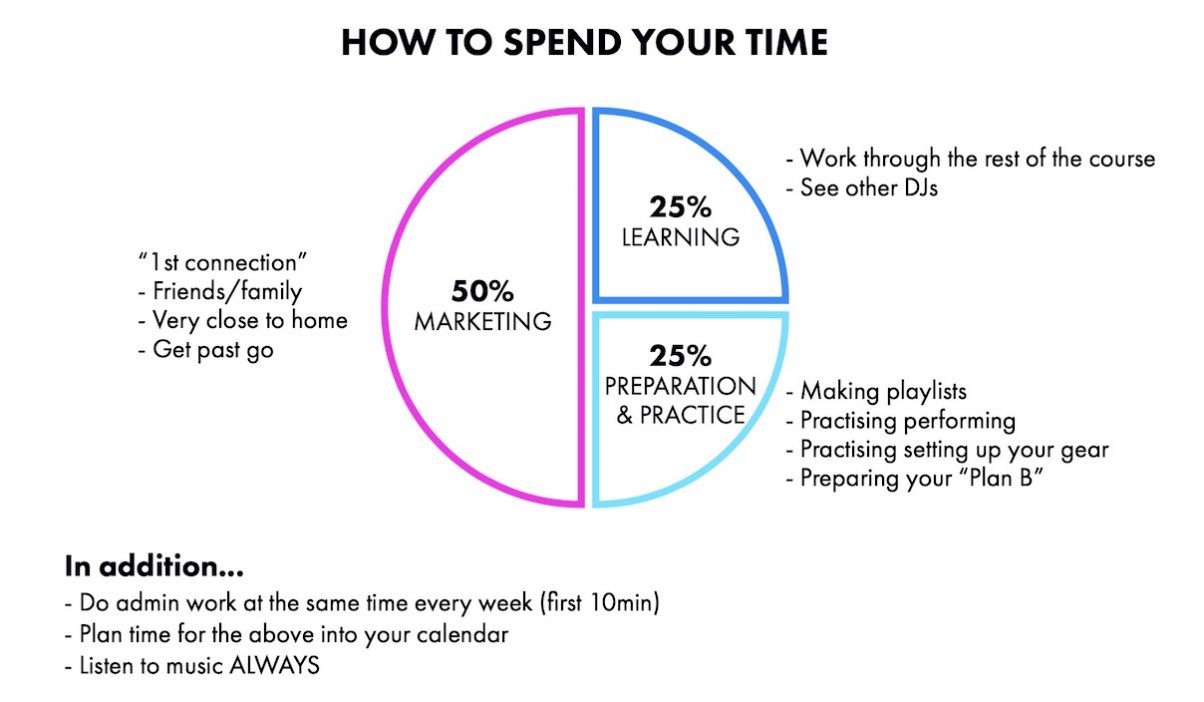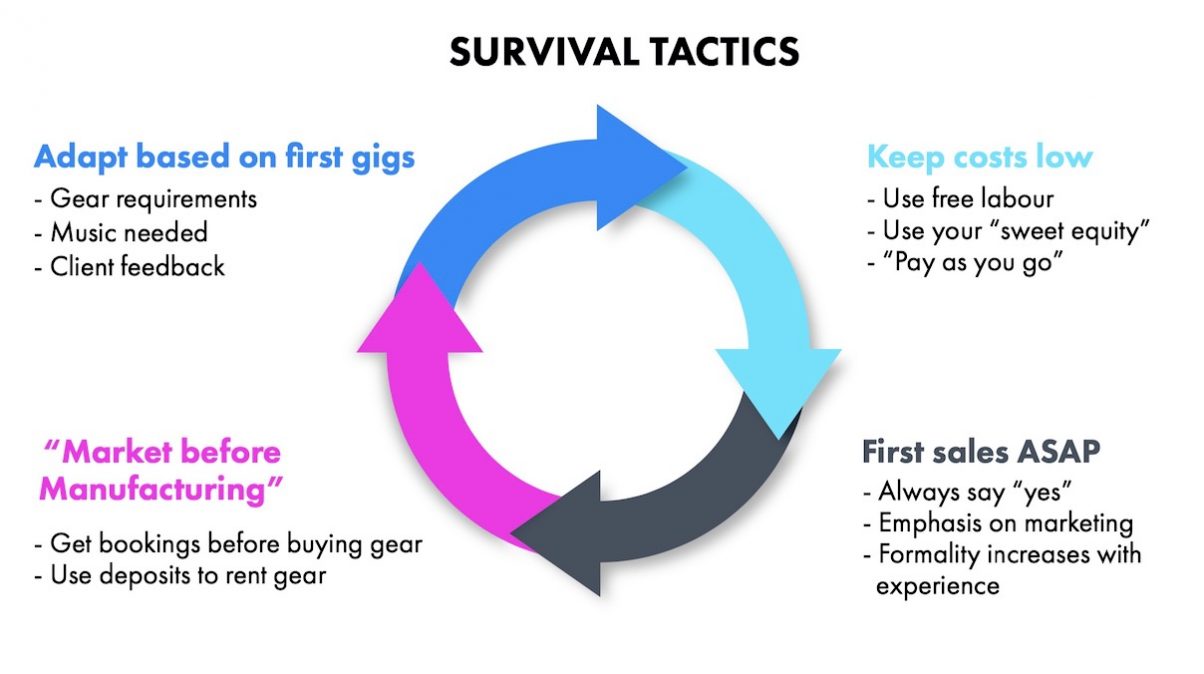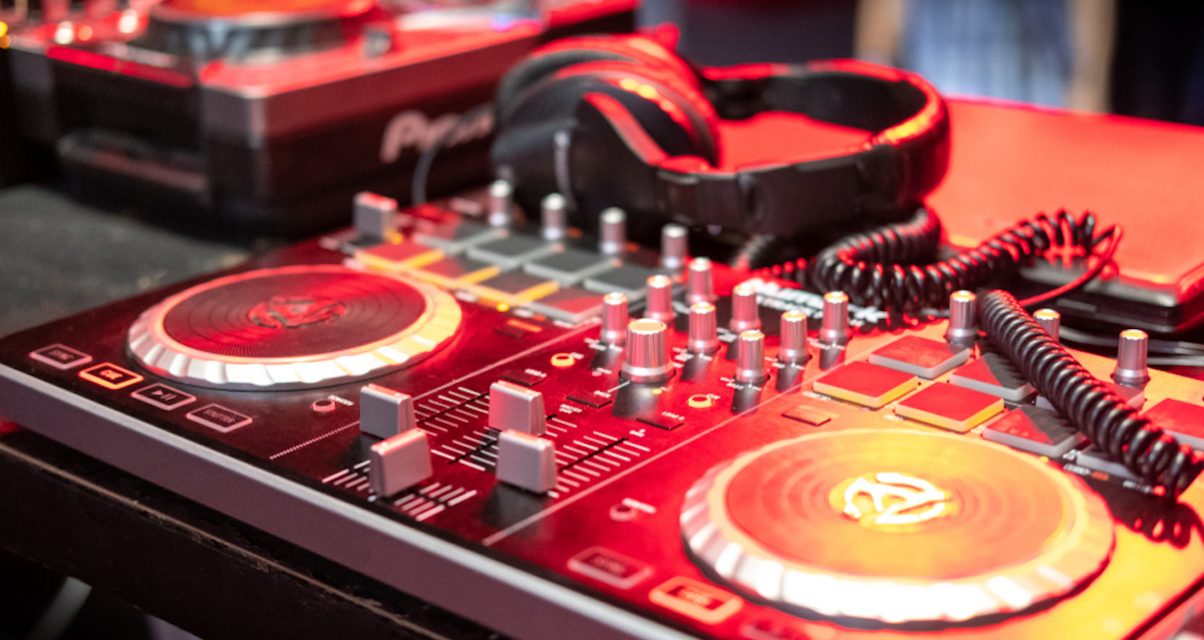What this is about…
Have you ever thought about starting a DJ business, or are you already trying to be one? For many, becoming a mobile DJ is a great way to earn extra money, be able to play out more regularly, carry on DJing when family and career become a priority, or play extra gigs alongside club work. That said, for many, mobile DJing is all they do – and they love it that way!
This is one of a special series of Become A Mobile DJ Week articles, exploring the secrets of DJs who’ve built profitable, easy-to-run mobile DJ businesses. If you want to take this further, do check out our New Mobile DJ Blueprint course.
Quick recap…
Back in Part 1, we looked at the types of mobile DJ, before looking in Part 2 at a change in thinking that’s going to be necessary if you’re serious about running a successful part-time mobile DJ business. In Part 3 we showed how the “New Rules Of Business” have changed everything for mobile DJs, and in Part 4 we looked at some of the things modern “side hustle” mobile DJs do, and the services they use, to build profitable, part-time micro DJ businesses.
Your first 90 days
Today’s fifth and final lesson is a LONG one as you’re now ready to fully gain from what I have to share. We really are going to hit the ground running, because this lesson is based on a piece of real training material adapted from one of the lessons in our New Mobile DJ Blueprint course, a complete course designed to help DJs set up side-hustle mobile DJ businesses from beginning to end.
Today we’re going to focus on how to start a mobile DJ business, specifically how to spend your first 90 days as a new mobile DJ – or, how to spend the next 90 days if you’ve decided now is the time to step up your game and finally make this work!
One of the biggest problems with running, never mind growing, a side hustle mobile DJ business, is knowing how to spend the limited time you’ve got for this. With family, work, leisure and other commitments in the typical busy life, you may find yourself with only a few hours a week that you can put into this.
And on top of that, one of the biggest causes of procrastination is not knowing exactly what you should be doing when you do finally get some time to spend on your business. So here at Digital Dj Tips, we teach our students a simple formula that can be adapted to suit whatever time you have:

Starting a DJ business: Get the handout
Grab your copy of the graphics in a handout as a PDF which you can then print if you wish – click this link to download it directly.
How this works
Let’s say you have four hours a week – an hour a night Tuesday and Thursday, and a couple of hours at the weekend, for instance – to work on your business (not including any DJ gigs, of course – DJ gigs are working “in” your business, not “on” it).
Looking at the graphic above, that means you could decide to spend your two hours at the weekend on marketing, and those two hours in the week on Learning, and Preparation & Practice.
What this immediately gives you is a framework that you can stick to, week in, week out. While these hours may seem small for starting a DJ business, they all add up – after just 90 days, you’ll have spend two whole working days practising and preparing, two whole working days deliberately expanding your knowledge across the various areas of your business, and four whole working days marketing your business. It all adds up.
So let’s look a little more at how you’ll be spending your time in each of those areas:
50% marketing
Your number one aim is to get your name out there and get bookings in your calendar. That’s why a full half of your time is spend getting those very early bookings. In the New Mobile DJ Blueprint course we go into much more detail about how to do this, but let me talk you through the four things on the graphic above, right here:

- “First connection” – Are you on LinkedIn? You know the people there who are shown as “1st connections” in your list of contacts? These are people you know directly, and can pick up the phone to speak to, right? And that’s what this means. Who do you see daily who you can talk to about your DJing, and ask if they need a DJ for something? Who’s in your phone’s speed dial, last 10 called, last 10 received etc? There is absolutely no point spending money on advertising until you’ve spoken to these people. I’ll bet you haven’t, or haven’t recently. So do it. They are the source of your first or next gigs, for sure.
- Friends and family – These people, frankly, owe you one. So lean on them. Explain your hopes and dreams for your DJ business and see if they can get you gigs, either for themselves or by asking around their friends and their connections. One of the truths about this kind of thing is that gigs lead to gigs, so as we’ll see a bit later, really getting ANY gigs on the board early-on is essential – and there’s nobody better than your friends and family to help you make that happen
- Very close to home – Just as you have an “inner circle” of people, you have a geographical “inner circle” around your daily life – the neighbourhood you live in, the places you visit regularly, the venues you naturally go to to eat, drink, hang out with friends and so on. Your first gigs will more than likely be at these venues. Don’t look further until you’ve looked on your own doorstep. Approach venues, talk to people in the cafes, pubs and restaurants you already frequent, and get the bookings that are under your nose. Too many DJs plan big marketing campaigns and start targeting 20 miles around, when they don’t even walk out of their front door and target 2 miles around first!
- Get past go – Marketing can be intimidating, because there’s so much to do, and you start off with very little confidence that you can “do it right”. The trick is to get some momentum – to “get past go”. You can always come back later and change your business cards, or your website, or your Instagram feed and so on, as you improve – the trick is to “get past go”. Because what happens is that once you solve a couple of problems, get a booking or two, and see some wins (and failures), you’re “in the game” – you’re not worrying about starting any more, you’re just thinking about improving. That’s where you want to be. So “get past go”
25% learning
Remember back in Part 2, I spoke about how succeeding as a side hustle mobile DJ will take a “new attitude”? What I was talking about was an open-mindedness, a willingness to learn.
The truth is that there is a lot of new stuff to learn when starting a DJ business like this (just look at all the services I listed in Part 4, for instance). Apart from what I listed, there is also a lot you can learn away from your laptop, out and about or just watching and listening to other DJs.
Putting time aside to simply expand your horizons, to take on new skills, to assimilate new knowledge, is essential when you want to satart a DJ business – or any business, come to that. Nobody is an expert nowadays, everybody is feeling through what’s possible that wasn’t possible a year or two ago – so get used to not knowing, but make a point to find out whatever it is that you feel you need to know to push something forward. For instance, you could:

- Work out how to use your streaming service for music more effectively
- Listen to a local DJ you admire and see how they mix or structure their sets
- Figure out how that annoying laptop DJ you instinctively don’t like is actually managing to fill his or her dancefloor while apparently just hitting “play”
- Study another DJ’s website to see how they talk about themselves on their About Us page, and get some ideas for yours
- Read articles on mobile DJing (or even just recap this series) to see if there are ideas you’ve missed or forgotten about
- Study the manual for a piece of gear you own (or don’t – manual PDFs are easy to find online) and work out how to use a feature you’ve body-swerved until now
Once you start looking for things to learn about, and once you accept that this is not only an acceptable way to spend some of your time, but a crucial one, you’ll soon get the hang of it. One tip is to write down things you’d love to dig into when you have time; then, when it comes to your learning session, just pick one where you feel your energy lies.
25% preparation & practice
You might think that you should spend more of your time doing this than a quarter, and the truth is that when you’re playing an important gig the next day, you will miraculously find however long it takes to prepare properly so you don’t make a fool of yourself (that thought of making a fool of yourself in public is a particularly powerful motivator!).
But the purpose of tying 25% of your time deliberately, and no more, to this is to make sure you make time for the other two things – because if you don’t do this, you simply won’t grow and you won’t get to where you want to get to. And most DJs try and spend ALL of their time doing this, which is understandable: After all, this bit is the most fun, or at least, the closest to what you’d be doing if this was simply a hobby, not what you have to do when starting a DJ business.
So – you’re probably already completely sure what you’ll be doing when you next get some “deck time”, let’s run through our list quickly nonetheless:
- Making playlists – You should never DJ from your “master collection”. You should always DJ from crates/playlists/folders that you’ve thought about beforehand. As a very minimum, put together a playlist for each and every gig you play, that contains around double the number of tracks you think you’ll play. To be clear, a “playlist” doesn’t imply you’ll play every track on it, or play the in the order they appear in, but it does give you a more focused “master collection” for that particular event, or time of night, or mood (ie “warm up singalong”) that makes it much easier to quickly lay your hands on similar songs than it would be if you were just browsing through your complete collection
- Practising performing – Never underestimate how much you’ll personally need to “raise your game” once you’re playing music in front of real people. A DJ performance is no less stressful than any other type of performance, be that public speaking, singing or theatrical, for instance, and so you need to be prepared for this. One of the best ways to do that is simply to practise, as if you were playing in front of a real audience – play music (and don’t stop if you mess up), use your mic, work on your body language and mannerisims, and record it – on video if possible. It may feel silly, but it’s invaluable nonetheless
- Practising setting up your gear – Ever been camping and taken a tent you didn’t know? It doesn’t really matter, if the weather is good and you have all day to work out where the poles go. But as soon as it’s a bit windy, the kids are hungry and it’s getting dark… well, I’m sure you’ve been there or can imagine. Point is, if you know how to put the tent up, you can cope. Same thing with DJing. There are a lot of “moving parts” to coordinate when setting up lights, stands, speakers, scrims, a facade, power, screens and so on – and there are things that will undoubtedly be thrown at you that you weren’t expecting when you get to a venue. So make sure that you’re utterly profificent at the stuff YOU are in control of
- Preparing your “Plan B” – One thing we teach in The New Mobile DJ Blueprint is the importance of having a “Plan B”. A Plan B can be different music (if the music you are playing doesn’t hit the spot), but even more importantly, a different technical set-up should you suffer issues with your gear. What if a laptop crashed? What if a speaker fuse blew? What if your lights failed? Your radio mic didn’t work (or picked up a police frequency instead)? What would you do? The point is, know this stuff! Make sure you have practised steps to get the music playing and the party back on the road again in all circumstances
OK so what we just outlined – at least, as far as the time breakdowns goes – is how you should spend your time generally. But let’s now look at some more particulars of the first 90 days, when your business, let’s face it, is delicate and in need of plenty of TLC in order to grow.

Starting a DJ business: Get the handout
Grab your copy of the graphics in a handout as a PDF which you can then print if you wish – click this link to download it directly.
How this works
Ask anyone who’s ever tried starting a DJ business, and they will tell you there is a very particular flavour to those early weeks. Excitement. Nerves. Elation at first sales. Worry when there seems to be no interest at all out there. It’s definitely a rollercoaster!
Our graphic above shows you what that “flavour” should be like for you. These four things are shown in a circle because they all feed into each other, and as long as you keep a close eye on all of them, you’ll be giving yourself the biggest chance of success. Let’s look at them, then:
- Keep costs low – Stands to reason, right? But seriously, “a penny saved is a penny earned”, especially at startup time. Remember those friends and family we spoke of earlier? Lean on them. Get them to do things for you to save you paying for them (think, web design, logos, accountancy, printing things out, helping at gigs, loan of online software accounts, loan of money…). Use “sweat equity” (that means not expecting to pay yourself for the time you put in). Use “pay as you go” options on any services, such as online services, phone etc, rather than contracts – even if the contracts are cheaper overall
- First sale ASAP – A “bias to sale” is crucial for a new business. Businesses grow by understanding what customers want, and no customers means no chance to get on this road. Also, in DJing, gigs lead to gigs. All this points to always saying “yes” to gigs at the start of your journey, but remembering that your business’s emphasis must be on marketing in order to get the gig flow up and give you a chance to raise prices (raising prices ALWAYS involves saying “no” to gigs eventually, by the way – there’s a detailed framework in the course as to how this works). The main point here, though, is “formality increases with experience”, meaning contracts, big paying events, high stakes etc. will come – but at the start, any gigs are wins. Take the gigs, play them, and learn fast
- “Market before manufacturing” – You know Kickstarter, right? Think of how the companies on there market products that don’t exist, and even raise money to pay for their manufacture ahead of time. Same with Tesla with new models – huge waiting lists, money in the bank before the first car has rolled off the production line. You can and should do exactly the same when you’re starting a DJ business. Don’t worry about gear when you’re getting bookings – just get the bookings! If you have to, hire or borrow the gear. Once you’ve been paid, you can start to buy stuff. If you ask for a deposit for a gig (and you should), use it to hire equipment for that gig. Juggle your pennies and stay debt free, and don’t think you need to own everything. Even big DJs often hire in equipment for particularly larger-scale shows, when they don’t own all they’ll need. Get used to doing this early on
- Adapt based on first gigs – Your first gig or gigs will teach you so much. As I said above, businesses grow by understanding what customers want. Whether it’s the music you play, the gear you use, your microphone style, what clients say to you afterwards, thing you learned about how you set up and break down, knowledge gained from talking to venue owners about your competition… it’s all solid gold stuff. So be ready to make changes, sometimes quite drastic ones, based on this first feedback. Smart side-hustle mobile DJs react quickly and completely to things they learn from their early gigs

Final word…
We’ve covered an awful lot in this series of five articles, designed to help you in starting a DJ business as a profitable and fun side-hustle. From being honest about the kind of business you want (and what’s possible), to getting your mindset right, to realising it’s the (new) business ideas that drive success, to understanding just how many services are out there to help you nowadays, to having a solid plan for your first 90 days… hopefully you’ve now got plenty to go off, and are ready to get started on your new or revitalised part-time DJ business immediately!
For many that’ll be all you need, but if you love the idea of my team and I teaching you all of this, showing you right from the beginning about every aspect of being a part-time mobile DJ – the gear, the music, the business side (marketing, sales, client care, admin), the performing skills, and how to grow over the months and years – you should check out our New Mobile DJ Blueprint course. It’s helped hundreds of DJs learn about starting a DJ business, and it can help you too.
Click here to learn more about the course
Now get good, get out there, and make the moments!
Starting a DJ business: Get the handout
Grab your copy of the graphics in a handout as a PDF which you can then print if you wish – click this link to download it directly.






![Grimes's DJ mess-up - Lessons for us all? [Live Q&A] Grimes's DJ mess-up - Lessons for us all? [Live Q&A]](https://cdn.digitaldjtips.com/app/uploads/2024/04/19032806/18april-WEBSITE-150x150.jpg)


